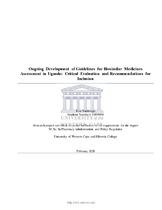| dc.contributor.advisor | Dube, Admire | |
| dc.contributor.author | Nantongo, Eva | |
| dc.date.accessioned | 2020-03-09T11:23:02Z | |
| dc.date.available | 2020-03-09T11:23:02Z | |
| dc.date.issued | 2020 | |
| dc.identifier.uri | http://hdl.handle.net/11394/7188 | |
| dc.description | >Magister Scientiae - MSc | en_US |
| dc.description.abstract | A Biosimilar is defined as a biologic product that is similar but not identical to the reference/originator biologic product. Biologic products have raised hopes of improving the quality of life especially in the treatment of chronic non-communicable diseases (NCDs). Of all the major health threats to emerge since the start of this century, none has challenged the very foundations of public health as profoundly as the rise of NCDs. However, the increasing cost of treatment of biologic products has raised many questions regarding its access in the context of multiple inequalities. The arrival of the patent cliff in this sector has given rise to biosimilars.
The emergence of biosimilars is expected to go a long way in reducing the cost of care of NCDs. The use of biosimilars is based on the assumption that they are of assured quality and of the same pharmaceutical standard as the reference biologicals. Their quality should therefore be rigorously controlled and assured. Uganda has had biologicals on its market that are claimed to be copies of the originator biologicals also known as biosimilars. Most of these products have not been approved through a biosimilar approval procedure, but have instead been licensed (by the Uganda National Drug Authority (NDA)) using the same requirements as generics or small molecule medicines. According to the World Health Organization (WHO) Guidelines on the Evaluation of Similar Biotherapeutic Products, a biosimilar that has not been demonstrated to be similar to a reference product through head-to-head comparisons should not be described as similar or be called a biosimilar. Although these products are on the Ugandan market, based on the above, they cannot be referred to as biosimilars. In November 2017 however, NDA embarked on the process of developing guidelines for assessment of biologics, and a specific guideline for assessment of biosimilars. | en_US |
| dc.language.iso | en | en_US |
| dc.publisher | University of Western Cape | en_US |
| dc.subject | Biosimilars | en_US |
| dc.subject | Medicines assessment in Africa | en_US |
| dc.subject | Registration of medicines in Uganda | en_US |
| dc.subject | non-communicable diseases | en_US |
| dc.title | Ongoing development of guidelines for biosimilar medicines assessment in Uganda: Critical evaluation and recommendations for inclusion | en_US |
| dc.rights.holder | University of Western Cape | en_US |

